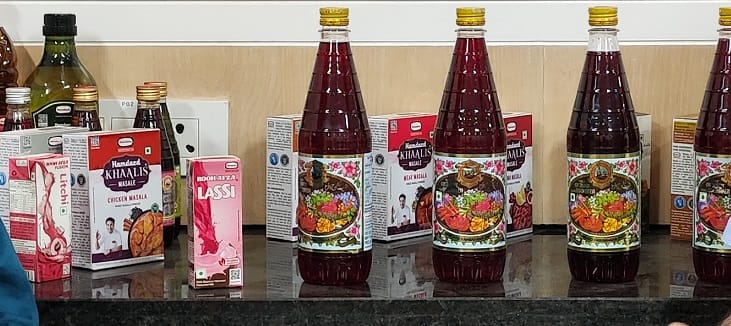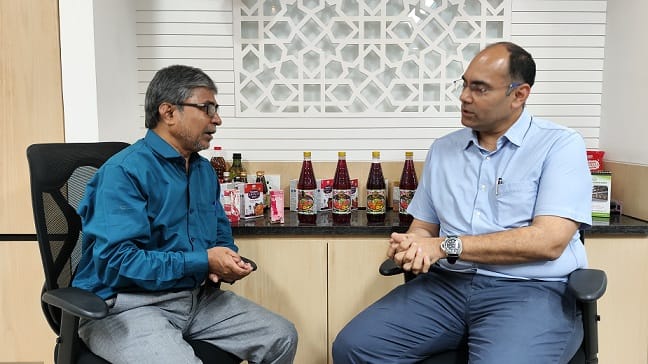Last Updated on April 22, 2025 8:19 pm by INDIAN AWAAZ
It is the drink of India. It’s served in temples, mosques, gurdwaras, says Hamdard CEO Hamid Ahmed

By Abdul Bari Masoud and Andalib Akhter
In an era where even beverages are not spared from polarising narratives, a recent controversial remark by yoga guru and Patanjali co-founder Baba Ramdev has stirred an unexpected storm—this time targeting the century-old summer staple, Rooh Afza. Speaking at a wellness summit in Haridwar, Ramdev labelled the beloved drink as part of a so-called “Sharbat Jihad,” alleging that Hamdard’s popular syrup serves a hidden agenda.
The remark, both shocking and laughable, instantly ignited a flurry of reactions on social media. Hashtags like #SharbatJihad and #DrinkOfUnity trended for days as netizens turned satire into solidarity. One user tweeted, “I added Rooh Afza to my milk, now apparently I’m part of an ancient syrup conspiracy.” Another quipped, “Waiting for Patanjali to launch Swadeshi Sharbati Sanjeevani.”
Street vendors, political figures, and ordinary citizens alike pushed back. Kishan Kumar, a juice vendor joked, “If it’s jihad, it’s the tastiest one I’ve ever sold.” Even politicians weighed in, dismissing the controversy as a distraction. “They want us to fight over soft drinks now when inflation and unemployment are skyrocketing,” said a senior opposition leader. “Chutney Jihad, what comes next?”
Amid the media frenzy, Hamdard Foods India—the iconic Unani brand that produces Rooh Afza—chose grace over grievance. In an interview to Indian Awaaz, Hamid Ahmed, CEO of Hamdard Foods India and grandson of the visionary founder Hakeem Abdul Hameed, responded not with indignation but with an invitation: “We cordially invite Baba Ramdev to our factory for sharbat and a glass of truth.”
“Rooh Afza Unites, It Doesn’t Divide”
Tracing the brand’s legacy, Ahmed proudly recalled that Hamdard began as a humble Unani clinic in Old Delhi in 1906, founded by Hakeem Abdul Majeed. What started as a proprietorship became a trust in 1948, dedicating all its profits to charitable causes. “We continue to follow the trust deed that outlines our commitment to health, education, and skill development,” he noted.
Ahmed became a trustee at the age of 18 and now serves as the Chancellor of Jamia Hamdard University. As a modern, UK-educated leader, he has overseen Hamdard’s growth while preserving its founding values. “Rooh Afza has always transcended religious and cultural boundaries,” he said. “It is the drink of India. It’s served in temples, mosques, gurdwaras, and homes across the country.”
When asked about Ramdev’s specific claim that Rooh Afza profits are funneled into mosques and madrasas, Ahmed was unequivocal. “Eighty-five percent of our proceeds go to charitable initiatives—healthcare, education, and skill development. We have never been involved in religious funding,” he clarified. “The trust operates independently and transparently.”

Regarding accusations that Hamdard sends money to Pakistan, Ahmed called it “absurd and completely false.” He explained the history: after Partition, Hakeem Mohammad Said—Hakeem Abdul Majeed’s son—established Hamdard in Pakistan and later in Bangladesh. “These are separate entities. Hamdard India has no financial or operational ties with them,” Ahmed said firmly.
Claims of discriminatory hiring practices were also dismissed. “We employ people from all communities, based on merit alone,” he added. “Anyone is welcome to visit our offices and factories to see the diversity of our workforce.”
Market Impact and Consumer Loyalty
Ironically, the controversy seems to have boosted Rooh Afza’s popularity. “Our sales have not dropped—in fact, they’ve risen,” Ahmed said. “People who never bought Rooh Afza are now buying it in solidarity. The nation has given a unanimous mandate for love over hate.”
Rooh Afza, with its blend of natural herbs, fruits, flowers, and vegetables, remains one of India’s most trusted drinks. Over 100 crore glasses are consumed annually, making it a permanent fixture in Indian kitchens.
Innovation Rooted in Tradition
Hamdard is also evolving. With rising health consciousness, especially regarding sugar intake, the company has launched Rooh Afza LITE, a sugar-free version made with maltitol, a low-calorie sweetener. “It took us a decade of R&D, but we wanted diabetics and the health-conscious to enjoy the same great taste,” Ahmed said.
The brand is also expanding its portfolio under his leadership. “We’ve worked with Deloitte to modernize our food division. Our Khaalis line of spices, Hamdard Honey, saffron, hing, isabgol, and other natural products are performing exceptionally well. We’ve also introduced Rooh Afza-based milkshakes, lassi, and other ready-to-drink beverages,” he shared.
Upholding the Unani Legacy
Though Hamdard is known for Rooh Afza, it remains deeply connected to Unani medicine. “We have two separate trusts—one for Unani and one for food products—to ensure dedicated focus on each,” said Ahmed. The company has been steadily expanding its reach in both sectors, reflecting their founders’ vision for holistic well-being.
Responding to questions about government neglect of Unani medicine, he cautioned against sweeping generalizations. “Both wings—Unani and Foods—are growing, and we are receiving increasing support for traditional medicine initiatives,” he added.
A Century of Service, A Future of Faith
Hamdard’s mission, inspired by the philosophy of “Hamdard”—one who shares the pain of others—*remains as relevant today as ever. Despite political mudslinging, the company continues to be a beacon of integrity, cultural unity, and service to society.
When asked about the future, Ahmed is optimistic. “We want to be in every Indian household. Our goal is not just to grow, but to serve.” As misinformation brews elsewhere, Hamdard’s Rooh Afza is quietly doing what it’s always done: offering a refreshing taste of unity—one glass at a time.
